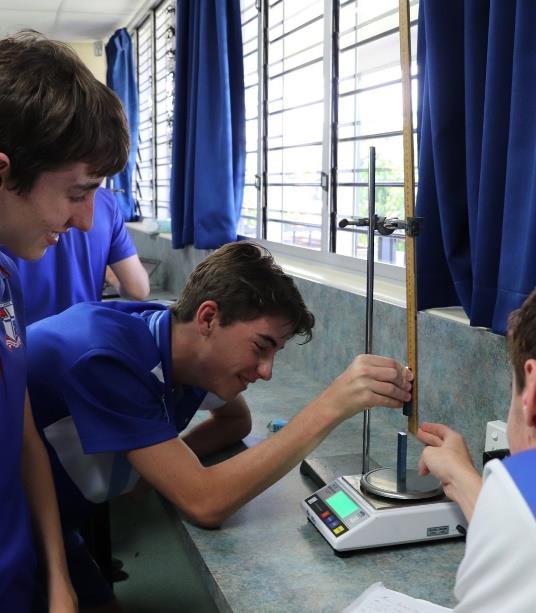
2 minute read
Physics
Subject: Physics Year Level/s: 11 and 12 Subject Type: General | Elective ATAR Contributor: Yes Pre-requisites: Year 10 Physics, Year 10 Mathematical Methods, Year 10 English
QCE Points: 4
Why study this subject?
Physics provides opportunities for students to engage with the classical and modern understandings of the universe. Physics aims to develop students’: • Appreciation of the wonder of physics and the significant contribution physics has made to contemporary society • Understanding that diverse natural phenomena may be explained, analysed and predicted using concepts, models and theories that provide a reliable basis for action • Understanding of the ways in which matter and energy interact in physical systems across a range of scales • Understanding of the ways in which models and theories are refined, and new models and theories are developed in physics; and how physics knowledge is used in a wide range of contexts and informs personal, local and global issues • Investigative skills, including the design and conductof investigationstoexplore phenomena and solve problems, the collection and analysis of qualitative and quantitative data, and the interpretation of evidence • Ability to use accurate and precise measurement, valid and reliable evidence, and skepticism and intellectual rigour to evaluate claims • Ability to communicate physics understanding, findings, arguments and conclusions using appropriate representations,modes andgenres.
What do students study?
Students examine energy transfers and transformations and how heating processes, nuclear reactions and electricity is essential to meet our global energy needs. Students will examine motion and waves and describe linear motion in terms of displacement, velocity, acceleration and time data. They will examine the relationship between force, momentum and energy for interactions in one dimension. Students will use Newton’s Laws of Motion and the gravitational field model to analyse motion on inclined planes, the motion of projectiles and satellite motion. Students examine relative motion, light and matter that could not be explained by classical physics theories. Students evaluate the contribution of the quantum theory of light to the development of the quantum theory of the atom and examine the standard model of particle physics and how it relates to the Big Bang Theory. Unit 1 Thermal, Nuclear and Electrical Physics Unit 2 Linear Motion and Waves Unit 3 Gravity and Electromagnetism Unit 4 Revolutions in Modern Physics
Assessment Techniques
• Data Tests • Student Experiments • Research Investigations • Written Examinations • External Examination (50%)
Post Secondary Pathways
Physics is a General subject suited to students who are interested in pathways beyond school that lead to tertiary studies, vocational education or work. A course of study in Physics can establish a basis for further education and employment in the fields of science, engineering and information technology.





